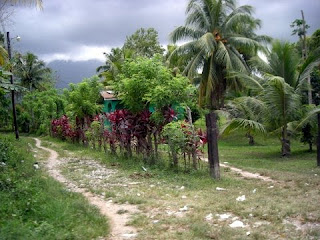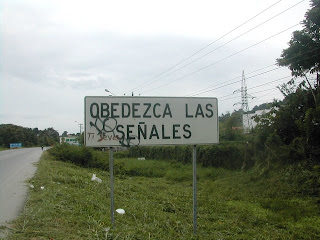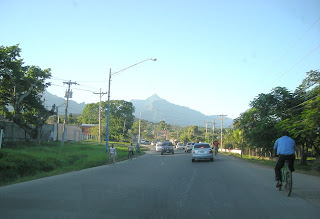(John Travolta looking good in his dress)
Photo: David James/New Line Cinema
Most women would not buy a dress without seeing it, touching it, trying it on unless there was no other choice, and − this is a big one − unless there was a pretty good guarantee that they could get their money back if it didn't fit. For sure most men would never buy a car without first taking it for a test drive and kicking the tires. Lots of people won't even commit to buying a new flavor ice cream unless they can taste it first to make sure that they like it!
Why, why, why, then will so many people quit their job, 'sell the farm', pack up and move to a foreign country without trying it out first? Or even worse, buy a property in a foreign country without ever seeing it or after only a week-long visit to the country, listening to promises about how all the locals are so nice and there will be water, electricity, security, roads, .... some day. "As soon as enough lots are sold...." Hah!
The truth is, for both foreign and local investors, that day doesn't always come. The money is spent and the contractor or the developer, and maybe the nice attorney to whom he probably introduced you to handle your purchase, have both moved on to fresh territory. The Honduran courts rarely help foreigners to get their money back from a fraudulent deal and that probably is true for most Central American countries as well as Mexico.
Some people say that they can't afford an exploratory trip here or their work schedule won't allow them to stay for an extended time. What?! You can't afford not to. The money that a trip would cost is cheap insurance. Those who quit their job, 'sold the farm', and moved only to find out after a few months or a couple of years that the life in a third-world country is not for them are the ones who are really suffering needless expenses.
While there are no real statistics on this, it is often estimated that 50% of expatriates do not stay past a year or two. The adjustment is just too much. What is the hurry? Is it because the real estate agent said that the lots won't last long, the prices are going up, or he has another interested buyer? Uh-huh. I thought so.
It's not cheap to move your belongings abroad and even worse to move them back. Money spent applying for residency is down the drain. You could be stuck trying to sell a property in a foreign country for months or years while meanwhile trying to figure out how and where you will live in another country since you no longer have a liquid nest egg.
I suppose that at least part of the answer to my question is that many think of moving to a foreign country as a great adventure. I was guilty of that myself. It was an adventure all right, just not always exactly in the romantic way I had in mind. I had been to Honduras, but as a tourist, and believe me, from the minute I stepped off the plane as a potential immigrant with my Honduran spouse, everything was vastly different than when visiting as a tourist.
Even the climate felt different! As a tourist, I stayed in air-conditioned rooms cleaned by maids, laid around the beach or pool, was served my meals in breezy champas on the beach. I wasn't cleaning house, gardening, cooking, or living in a tiny airless apartment when I was on vacation. Of course, it isn't the same!
Things that are quaint and make you feel like a pioneer on vacation can get old when you have to deal with them daily. "Oh, my! The water went out for 20 minutes yesterday just when I wanted to take a shower!", said a tourist. − Try not having running water for 23 days!
Get to know the area you are considering. Some locations in Honduras have most of the things you could want. Others, not so much. Maybe an hour drive down a dirt road once a week to buy groceries sounds like fun. What will you do when rainy season or a hurricane or earthquake washes the road and bridge out and you can't get there? That quaint little colonial town may seem an ideal place to live....that is until you need an auto part, a tool, or some ingredients for your favorite meal and the only place you can get it requires a day-long trip.
What if you have health problems or have an accident? Believe it or not, there are many places where no doctor or hospital is available, or at least not one that you would want to go to. Driving a few hours once or twice a year to visit a good doctor in the big city doesn't sound so bad. But what if you are injured or too sick to make that drive?
Do you have school-age children? Younger children may adjust very well, but some children may be very unhappy. Education is a huge issue. You probably will not want to send your children to a Honduran public school and good private schools are hard or impossible to find in some areas.
You can and should find out about all of these things in advance of a permanent move. Renting a house in the area where you think you want to live is cheap (in Honduras). Oh, sure, many of us think that paying rent is throwing money away. In this case, many expats (chime in here!) will tell you that it is the cheapest 'travel insurance' that you can get. If things don't work out for whatever reason, all you have to do is pack up and leave. Hopefully, you will still have a house to go back to. If you decide you like it, you will have the knowledge and experience to make good decisions
Now in 2010, there is a whole lot more information about Honduras, immigration, and the expatriate life on the internet than there was when I came in 2001. I think that reading blogs of other expatriates in other countries is one of the best ways to find out what daily life is really like. Honestly consider the negatives as well as the positives. It's the people who can't bear to read a negative word about Honduras who I think will have the hardest time in the long run − or more accurately, in a very short time. You have to be realistic.
Just remember, though, that people who didn't make it in their new country will rarely be blogging about it, nor will you likely find them talking about their experiences in internet discussion groups. Those could be the most enlightening stories of all, but you probably won't read about them. It's just human nature that people don't want to admit to bad decisions.
While reading everything you can about these topics is a very good first step, there is no substitute for trying it out yourself personally. No one else can know how or whether you and your family will adjust to life here.
No, it's not hell on earth. I'm not trying to say that! But it is different and everyone has different expectations and different tolerance levels for change. The way to find out if your expectations can be met is come for a long stay. I recommend six months. Rent a house, buy your groceries, cook your own food, meet the locals, experience the real life in Honduras.
By now, if you are in the exploratory mode, you might be saying, "Oh, she's so negative! I know that we're going to love it. It's paradise compared to where I am." You are probably also saying, "...and it's so cheap to live there, too!" How cheap it is, is a whole other topic, but let me just say that while many expatriates think they will be content to live like a local resident, they probably won't.

They will probably want a house just a little bigger and better appointed. They will probably want a kitchen with more than 18 inches of counter space. They will want to be in a safer area. They will want internet service, a good sized TV, cable service, and their own car. They may want to travel and go out to eat a little more often. They may want to splurge every now and then on those expensive imported items that they miss from home. They will probably not want a wood burning stove or to wash their clothes on a scrub board. After all, who wants to move to another country in order to live like a pauper?!
Maybe you and each of your family members will be among the lucky ones who do love living in Honduras or another foreign country. Maybe you'll even find the perfect dream house on the internet being sold by an honest person. But why risk it when it is possible to take that country for a test drive first?
































 Welcome to my Blogicito —
Welcome to my Blogicito — 








